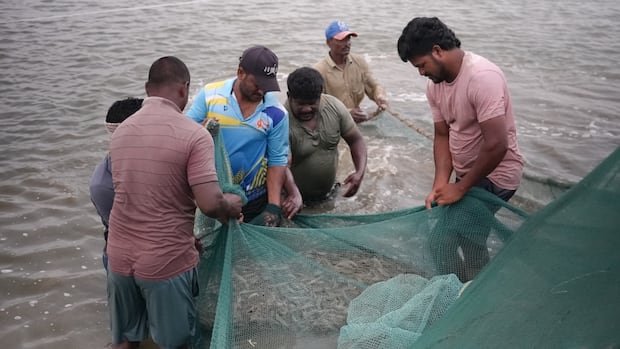A group of twelve men jovially entered a shrimp pond in Andhra Pradesh, India, dragging a large net to catch shrimp. Despite the light-hearted atmosphere, there were concerns about the significant impact of the 50% tariffs imposed by the United States on Indian shrimp exports, particularly affecting the frozen shrimp industry.
Before the tariffs, the U.S. was the primary market for India’s shrimp exports, accounting for over 40% of sales totaling more than $2.5 billion US ($3.5 billion Cdn) in the previous fiscal year. However, the current situation has led to a decline in shrimp harvesting frequency, with most of the catch being stored due to halted shipments to the U.S.
Workers like Bhaskar Kokkiligadda, who move between shrimp farms in Andhra Pradesh, are facing economic hardships. Many workers are accepting wage cuts or showing up for work despite not being needed, hoping to earn extra income. Kokkiligadda mentioned a significant reduction in workdays from 20 to 10 per month, causing financial strain.
The impact is severe in Andhra Pradesh, which produces a large portion of India’s shrimp, previously destined for the U.S. market. The escalation of tariffs from 25% to 50% by U.S. President Donald Trump, in response to India’s crude oil purchases from Russia, has further exacerbated the situation.
Praveen Sabbineni, who owns multiple farms in Andhra Pradesh, expressed distress over the nearly 40% drop in shrimp prices, leading many farmers to contemplate abandoning shrimp farming. Despite efforts to explore alternative export markets, the transition could take months, intensifying the challenges faced by the industry.
Small-scale farmers, like Edukal Basani, are struggling to find buyers due to the hefty U.S. tariffs. Basani recently harvested shrimp but could not sell them, resulting in losses and financial strain. Despite government subsidies, farmers like Basani are finding it increasingly difficult to sustain their operations, with some considering leaving the industry.
The repercussions are not limited to farmers but are felt across the shrimp processing sector, where many women are employed in peeling and deveining shrimp. These jobs, albeit challenging and often exploited, provide essential income for many women who have limited alternative employment opportunities.
Indian officials are eager to negotiate a trade deal with the U.S. to alleviate the tariff burden. However, discussions face obstacles, with disagreements over key issues such as trade barriers and sectoral access. The uncertainty surrounding the trade negotiations adds to the anxiety among industry stakeholders, including workers like Radhika Enti, who fear the potential closure of processing plants and its impact on livelihoods.
The situation underscores the grim reality faced by India’s shrimp industry, where livelihoods are at stake, and the future remains uncertain amid ongoing trade disputes and economic challenges.

